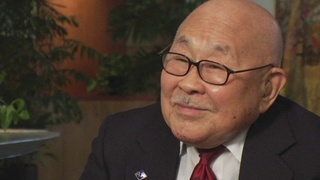Interviews
Defining "Nikkei"
Okay. Nikkei is really a Japanese term. Quite simply, it means a person of another country who is of Japanese descent. What it means to me in a more fuller sense is that I am bi-cultural. And that a part of me as a Nisei is hooked into Japan in a very odd kind of way, but firmly rooted in this country. Because one result of going to Japan was to realize that, for better or worse, I am a Canadian. My soul is rooted in the landscape of this country. And we talked before of land, and how much it influences who you are and what you've become and what you're a part of. So that the scale of land in Japan, which is very narrow, just small. Because it's a teeny little island, wore on me. Because I needed an expansive landscape of Canada. So if, for no other reason, I am Canadian in that sense.
But still, there's a part of me that is hooked into Japan through my parents. And probably, in a good way. Because the Japan they represent is the old Meiji era. And there are values, I think valuable values. Worthy values. That they inculcated in me, and that was a part of their life and their moral structure. You know, gaman. Ganbarru. Kizukau. Always aware of other people's feelings. All these things. To be humble, industrious. You know, simple values, but they are important. And values that are maybe not so strong now in Japan.
Date: February 9, 2011
Location: California, US
Interviewer: Patricia Wakida, John Esaki
Contributed by: Watase Media Arts Center, Japanese American National Museum
Explore More Videos


Postwar school-life
(b. 1930) Half Japanese and grew up in both Japan and the United States.

On Challenging Institutions
(1938-2020) Japanese American attorney and civil rights activist

Pop and Balls
(1938-2020) Japanese American attorney and civil rights activist



Conflicted about immigrating to America (Japanese)
(b. 1925) War bride

Advice from his mother
(1914–2015) Nisei YMCA and Japanese American community leader

Unique Identity from Having Multiple Backgrounds
(b. 1938) Philipines-born hikiagesha who later migrated to the United States.

Growing up Japanese in Hawaii
(b. 1952) Former banking executive, born in Hawaii



Parents identification as Peruvian Okinawan
Okinawan American whose parents are from Peru.

Okinawan cultural appreciation
Okinawan American whose parents are from Peru.

Prejudice against Okinawans from mainland folks
Okinawan American whose parents are from Peru.
